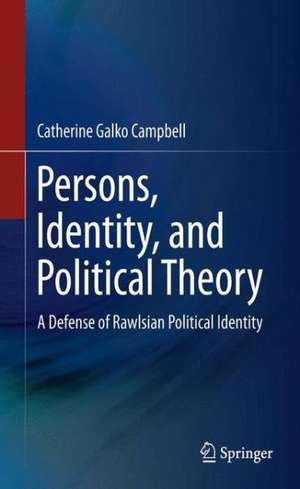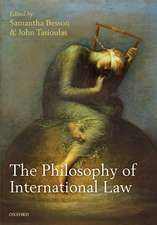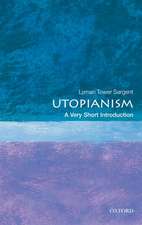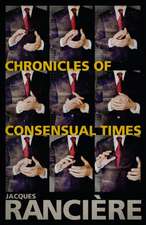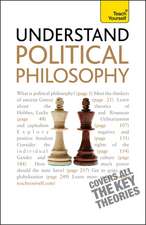Persons, Identity, and Political Theory: A Defense of Rawlsian Political Identity
Autor Catherine Galko Campbellen Limba Engleză Hardback – 4 dec 2013
| Toate formatele și edițiile | Preț | Express |
|---|---|---|
| Paperback (1) | 382.57 lei 6-8 săpt. | |
| SPRINGER NETHERLANDS – 23 aug 2016 | 382.57 lei 6-8 săpt. | |
| Hardback (1) | 389.88 lei 6-8 săpt. | |
| SPRINGER NETHERLANDS – 4 dec 2013 | 389.88 lei 6-8 săpt. |
Preț: 389.88 lei
Nou
Puncte Express: 585
Preț estimativ în valută:
74.60€ • 81.29$ • 62.86£
74.60€ • 81.29$ • 62.86£
Carte tipărită la comandă
Livrare economică 23 aprilie-07 mai
Preluare comenzi: 021 569.72.76
Specificații
ISBN-13: 9789400779167
ISBN-10: 940077916X
Pagini: 200
Ilustrații: XI, 187 p.
Dimensiuni: 155 x 235 x 17 mm
Greutate: 0.46 kg
Ediția:2014
Editura: SPRINGER NETHERLANDS
Colecția Springer
Locul publicării:Dordrecht, Netherlands
ISBN-10: 940077916X
Pagini: 200
Ilustrații: XI, 187 p.
Dimensiuni: 155 x 235 x 17 mm
Greutate: 0.46 kg
Ediția:2014
Editura: SPRINGER NETHERLANDS
Colecția Springer
Locul publicării:Dordrecht, Netherlands
Public țintă
ResearchCuprins
Dedication.- Acknowledgments.- Table of Contents.- Chapter 1: Political Identity, Perfectionism and Neutrality.- Chapter 2: Personal Identity and Liberal Political Theory.- Chapter 3: Clarification of the Liberal/Communitarian Debate and Metaphysical Objections to Rawls’s Conception of the Person.- Chapter 4: Taylor’s Conception of Persons and His Theory of Personal Identity.- Chapter 5: Defense of the Original Position.- Chapter 6: Objections to Rawls’s Political Conception of Persons.- Chapter 7: Defense of Rawls’s Political Conception of the Person.- Chapter 8: Rawlsian Political Identity.- Index.
Textul de pe ultima copertă
This book examines the conception of the person at work in John Rawls’s writings from Theory of Justice to Justice as Fairness: A Restatement. The book aims to show that objections to Rawls’s political conception of the person fail and that a Rawlsian conception of political identity is defensible. The book shows that the debate between liberals and communitarians is relevant to the current debate regarding perfectionism and neutrality in politics, and clarifies the debate between Rawls and communitarians in a way that will promote fruitful discussion on the issue of political identity. It does this by providing a clearer account of a conception of personal identity according to which persons are socially constituted, including the intuitions and assumptions underlying the communitarians’ conception of persons as “socially constituted.” It examines the communitarian objections to liberal political theory and to the liberal conception of persons, the “unencumbered self.” The book differentiates between two types of objection to the liberal conception of persons: the metaphysical and normative. It explains Rawls's political conception of persons, and the metaphysical and normative commitments Rawls incurs—and does not incur—in virtue of that conception. It shows that both kind of objection to Rawls's political conception of the person fail. Finally, modifying Rawls’s political conception of the person, a Rawlsian conception of political identity is explained and defended.
Caracteristici
Clarifies and explains the Liberal/Communitarian debate Explains the connection between early criticism of Rawls's original position and more recent criticisms of liberal notions of political identity Explains and clarifies the broader debate regarding the issues discussed in Will Kymlicka's book More fully explains the reasons that Sandel and other communitarians have criticized liberal political theorists, Rawls in particular Includes supplementary material: sn.pub/extras
